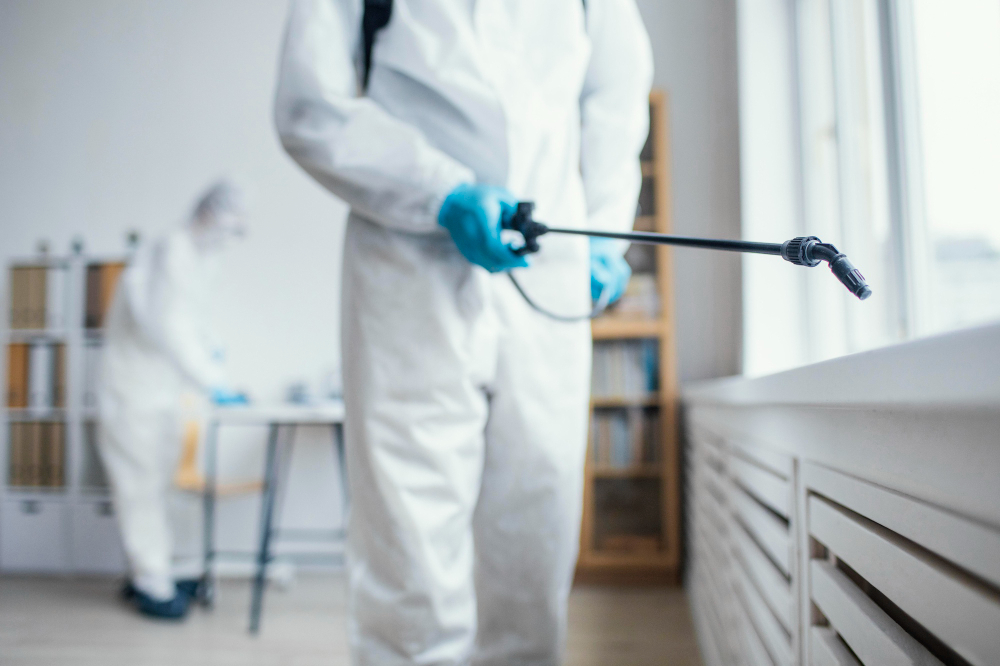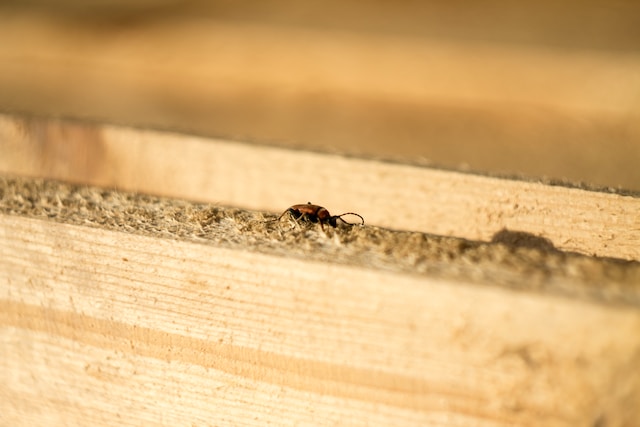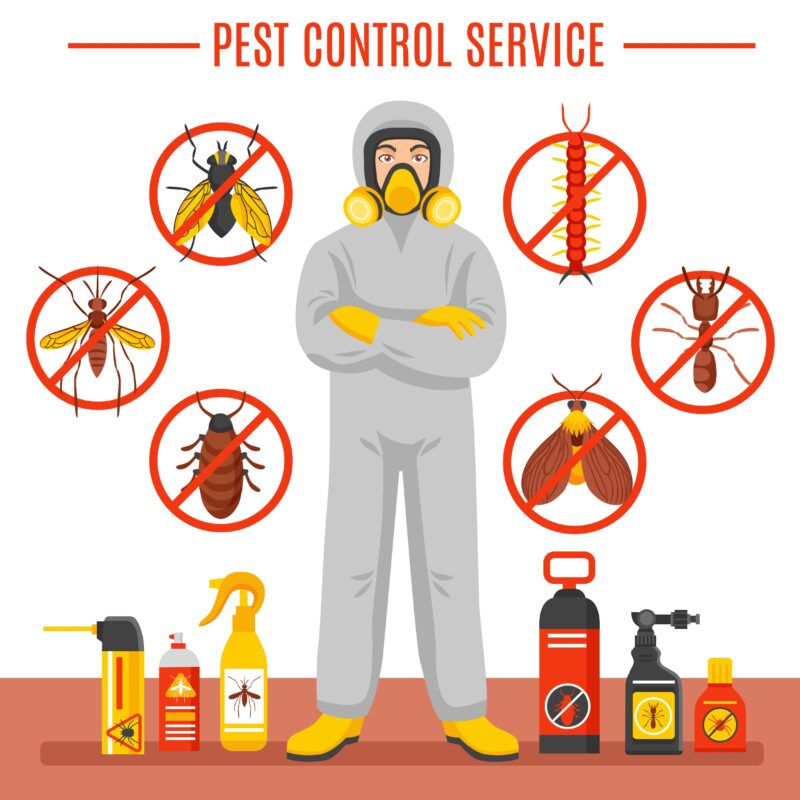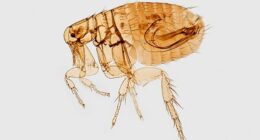Pest control deals with a wide range of pests that can infest homes and businesses, such as rodents, insects, and spiders. On the other hand, termite control specifically focuses on preventing or eliminating termites.
What is pest control?

The goal of pest control is to prevent infestations by implementing various strategies that target the specific type of pest in question. This may involve using chemical treatments, traps, or natural deterrents to eliminate existing pests and create a barrier against future invasions.
One key aspect of effective pest control is identifying the root cause of an infestation. By understanding what attracts these pests to your property – whether it’s food sources, water leaks, or entry points – you can take preventive measures to minimize their presence.
Pest control professionals are trained experts who possess knowledge about different types of pests and their behaviors. They have access to specialized tools and techniques that allow them to address infestations safely and efficiently.
What is termite control?

Termite control involves the management and eradication of termites, which are small insects that feed on wood and cause extensive damage to buildings and structures. Unlike other pests, termites can go undetected for long periods of time, making their presence even more destructive.
Termite control methods vary depending on the severity of infestation. One common method is the use of chemical treatments to eliminate existing termite colonies. This may involve applying liquid pesticides or using baiting systems to attract termites into treated areas.
Another approach is physical barrier systems, such as installing termite-resistant materials during construction or creating barriers around existing structures to prevent termite access.
Pest control Vs. Termite control – Key differences
Pest control and termite control are both important aspects of maintaining a pest-free environment, but they differ in terms of the pests they target and the methods used to eliminate or prevent infestations. Here are some key differences between pest control and termite control:
Target Pests:
- Pest Control: Pest control typically refers to the management and elimination of a wide range of pests, including insects (such as ants, roaches, mosquitoes, flies), rodents (such as rats and mice), birds, and other nuisance animals.
- Termite Control: Termite control specifically focuses on the prevention, detection, and treatment of termite infestations. Termites are wood-destroying insects that can cause significant damage to structures.
Methods and Treatments:
- Pest Control: Pest control methods involve a variety of techniques such as insecticides, baits, traps, physical barriers, and cultural practices to manage and eliminate pests. The specific method used depends on the type of pest being targeted.
- Termite Control: Termite control methods primarily include the use of specialized termiticides or termite baits. These treatments are designed to kill termites and protect structures from further infestation. Additionally, physical barriers like termite-proof construction materials or soil treatments may be employed to prevent termites from accessing buildings.
Scope of Infestation:
- Pest Control: Pest control can address infestations in both residential and commercial properties. It focuses on managing various types of pests that can cause damage, spread diseases, or pose a nuisance to humans.
- Termite Control: Termite control primarily deals with termite infestations in buildings and structures. Termites can cause significant structural damage, making termite control crucial for maintaining the integrity of the affected property.
Preventive Measures:
- Pest Control: Pest control often includes preventive measures to minimize the risk of future infestations. This may involve sealing entry points, implementing proper sanitation practices, and employing regular inspections to detect early signs of pest activity.
- Termite Control: Termite control places a strong emphasis on proactive prevention. This includes measures like routine inspections, addressing moisture issues, removing wood-to-soil contact, and installing termite barriers during construction or renovation.
Expertise and Certification:
- Pest Control: Pest control companies may employ professionals with expertise in handling a wide range of pests. Certification requirements can vary depending on the jurisdiction and the specific type of pest being targeted.
- Termite Control: Due to the specialized nature of termite control, professionals specifically trained in termite management are often required. They may hold certifications specific to termite control and have in-depth knowledge of termite biology, behavior, and treatment methods.
Pest control and termite control may overlap in certain instances, as termites can be considered a type of pest. However, termite control is a specialized field within pest management, focusing specifically on termites and their prevention or elimination.
Why you need both pest and termite control
Both pest control and termite control are necessary because they address different types of infestations and serve distinct purposes in maintaining a pest-free environment. Here’s are several reasons why you will need both.
- Comprehensive Pest Management: Pest control encompasses a wide range of pests, including insects, rodents, birds, and other nuisance animals. It addresses issues such as ant infestations, cockroaches in the kitchen, mosquito populations, rodent problems, and more.
- Protection against Structural Damage: Termites, specifically, are highly destructive pests that can cause significant damage to buildings and structures. Termite control focuses on the prevention, detection, and treatment of termite infestations.
- Different Control Methods: Pest control and termite control employ different methods and treatments tailored to the specific pests they target.
- Preventive Measures: Both pest control and termite control emphasize preventive measures to minimize the risk of future infestations.
Pest control and termite control complement each other in managing different types of pests and addressing specific concerns. While pest control deals with a wide range of pests and ensures overall pest management, termite control is crucial for protecting structures against termite damage. By combining both approaches, you can maintain a pest-free environment, protect your property, and ensure the well-being of occupants.
Types of pests and termites
| Pest Type | Examples |
|---|---|
| Insects | Ants, cockroaches, mosquitoes, flies, bedbugs |
| Rodents | Rats, mice, squirrels |
| Birds | Pigeons, sparrows, seagulls |
| Nuisance Animals | Raccoons, skunks, possums |
| Termites | Subterranean termites, drywood termites, |
| dampwood termites, Formosan termites | |
| Subterranean Termites | Eastern subterranean termites, |
| Western subterranean termites | |
| Drywood Termites | Western drywood termites, |
| Southeastern drywood termites | |
| Dampwood Termites | Desert dampwood termites, |
| Pacific dampwood termites | |
| Formosan Termites | Formosan subterranean termites |
How to find a good pest control and termite control company
Finding a reliable and professional pest control and termite control company is essential to ensure effective pest management.
Research and Referrals: Start by conducting research and seeking recommendations from friends, family, neighbors.
Check Credentials: Look for companies that are licensed and insured. Check if they have the necessary certifications and qualifications for pest control and termite control.
Experience and Reputation: Consider the experience and reputation of the company.
Services Offered: Ensure that the company offers comprehensive pest control services, including termite control.
Integrated Pest Management (IPM) Approach: Inquire if the company follows an Integrated Pest Management approach. IPM focuses on a combination of prevention, monitoring, and targeted treatments, emphasizing non-chemical methods and minimizing the use of pesticides whenever possible.
Free Inspection and Estimate: Many reputable pest control companies offer free inspections and estimates. Take advantage of these services.
Ask Questions: Don’t hesitate to ask questions during your initial contact with the company.
Compare Prices: While price shouldn’t be the sole determining factor, it’s essential to compare prices among different companies.
Contracts and Agreements: Carefully review any contracts or agreements provided by the company.
Follow-up and Maintenance: Inquire about the company’s follow-up procedures and maintenance plans.
By following these steps and conducting thorough research, you can find a reliable pest control and termite control company that meets your needs, ensuring effective pest management and peace of mind.
Image Credits
Featured Image By – macrovector on Freepik
Image 1 By – Freepik
Image 2 By – Константин Маманович on Unsplash









